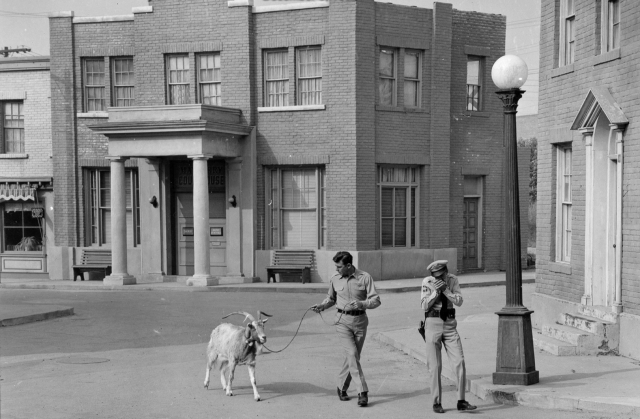Living large in Mayberry or tightening belts for 21st Century recessions? Which way forward for the Mountain Kingdom?
Budget season is coming up fast and Coun. Cary Fisher, a self-described “numbers guy,” has sounded the alarm: “Do you know what you’re paying for?”
Fisher came to council with an emphasis on trimming fat from the budget, but last year he felt that council didn’t get a solid chance to make spending cuts because councillors were wrapped up in elections.
“I’ve been asking people around town general questions about taxation in Rossland, service levels in Rossland, and all the things that feed into a budget cycle,” Fisher told council at the Oct. 22 regular meeting. “I was amazed at how little people understood what the City of Rossland actually funds.”
We’ve responded to Fisher’s concerns in a separate analysis. The three parts of the analysis cover revenues, community spending, and basic municipal spending.
Coun. Fisher “shocked” by residents’ lack of budgetary awareness
“I’m shocked,” he said. “There were some people who had some really clear ideas about [the budget]. And there were some other people who were like, ‘Really? We do that?’ We need to have that discussion so when we go into budget time we have a clear direction.”
“It doesn’t make any sense to me at all, to have all the discussions we have and to think that we live in Mayberry, or some place completely immune to what’s happening in the world right now,” he said.
“I thought that taxes were pretty high and that the economic times would warrant us tightening our budget, just like the feds and the province, but we obviously haven’t considered it,” he continued, saying he’d heard “both sides” of the taxation debate from residents.
“Some were flamboyant: ‘Yeah, the people at the City don’t know what they’re talking about.’ And the other balanced side was a notion I’d never even thought of, that higher taxes are your ticket to get into Rossland, that it’s a better quality of life so they don’t mind paying a little more.”
“My response back to them was, do you know what you’re paying for?” Fisher said.
“It probably is up to the citizens of Rossland to enlighten themselves on what it is that your tax dollar is going towards, in terms of museums and libraries and parks and trail societies and Bear Aware and the Sustainability Commission, and all of the things that we work on,” he said. “But I didn’t get a real sense from the people that I talked to that they really had a clue about all that stuff. Only the people that were in Bear Aware knew about Bear Aware stuff. Only the people that were in the Sustainability Commission really knew about what was happening there.”
“I’ve got a real concern,” he continued, “that 70 per cent of the public out there, if they had a chance to vote, [they’d say,] “Oh, you owe us all this money here…”
Fisher said he wanted to “put the question” to Rosslanders: “I would really like to know, when there’s 47 people that turn up to a museum meeting, how important is the museum to Rossland? It’s very important to the mayor, I know that. It’s very important to a few people that I know—that few people, that special interest group—but what about to the 90 per cent of us?”
“Let’s set aside essential services, maybe there can be some efficiencies there, but absolutely everything else needs to be on the table,” he said. “And the discussion needs to be with everyone in town. And we need to have a mechanism to have that discussion.”
Coun. Spearn said the OCP guides budget decisions
Coun. Jill Spearn responded, “I disagree with a couple things. First, people in general elect us to do the business. I’m not surprised by what you’re saying at all. I talk to a lot of people all the time who don’t have a clue what’s going on here. They don’t have a clue about the city, they don’t have a clue about [council], and frankly I’m not surprised. For many years as a young, busy, working parent, I didn’t know a lot of things about city operations.”
Secondly, Spearn argued that the Official Community Plan (OCP) is the “umbrella that says this is how the City of Rossland is moving forward.”
“The OCP is our guiding document that we worked on as a community,” she said. “And no, not every person in town was there. But if you want to talk about the museum, or you want to talk about any other facility around town, it’s in the OCP where we have those guiding statements: we care about heritage, we care about the history, and something that’s economically, socially, spiritually, and everything else sound. We’ve put that in the OCP.”
“If we start one-lining all these things and asking people how they feel, where are you going to end up? Chaos! And that’s why we have a sustainability plan,” she said. “And I know you, [Coun. Fisher,] personally don’t support some of those things in those documents, but the legislative way to go about that is to say okay, is it time to revisit the OCP? Frankly, personally, apart from Happy Valley, I don’t think it’s time.”
Fisher recently said that he “doesn’t buy the OCP” and considers it flawed in some areas.
Spearn concluded with her concern that Fisher’s approach to opening up line-by-line budget discussions with residents amounted to “abandoning ship and going helter skelter,” which she said was “not the right way to do business for our community.”
Coun. Fisher warns of sweeper downstream, fingers the media
Fisher replied with an allegory: “You’ve got a plan. Your boat is going down the river,” he said. “Everything’s going fine. You’ve been told that the river goes this way and that way. But there was a big storm that happened, and there’s a big sweeper—a big log across the river—and you should get out and portage, but you’ve got a plan to go down the river. By your way of thinking we’d go down the river into the log.”
“Things have changed,” he said, and “the budget that we have to work with has changed.”
“The OCP doesn’t have to change,” he argued. “It doesn’t mean we have to say ‘no’ to the OCP. It only means we’re spending money on things—and I just used some examples like the museum. I mean, I’m in favour of the museum, except am I in favour of the museum when there’s only 50 people in favour of the museum and there’s 3700 of us? Do we have other priorities we can go to, and come back to the museum later on? The OCP’s just a guiding document.”
Mayor Greg Granstrom interjected, “I see our CAO has a grin, because I’m sure that’s part of her plan, to put together something that shows what we’re spending all the money on.”
Fisher agreed, but turned his aim to the local media. “All I’m saying is I want those guys [pointing to Rossland Telegraph reporter Andrew Bennett and Rossland News reporter Arne Petryshen] to write something about it so we get some letters in here, so we get some people in here.”
Coun. Moore agrees there is a need for better communication with residents
Coun. Kathy Moore said she had recently returned from a “taxation seminar” in which a presenter showed a graphical timeline that compared municipal, provincial, and federal finances.
“Revenue from municipalities has stayed pretty flat relative to what’s happened for the province and the feds,” she said. “In terms of the amount of money that they bring in and they spend on things, we’re getting a tiny, tiny portion of that.”
Fisher broke in, “Oh, come on! Look at our town! Honestly…I am interrupting because just look at the numbers,” he said as the mayor called for decorum.
Moore continued, “It’s important. When we start picking things off line items, you don’t necessarily have the whole understanding. Citizens wouldn’t necessarily have the whole understanding, which is why we were elected—to have the whole picture.”
“It’s sort of like the situation we had with Columbia-Washington [design decisions],” Moore said. “There were all these public events, and all these people came in and looked at the plan and liked it or didn’t like it, or whatever they did. But then you got this sort of mob mentality with a petition in Ferraro’s, and all those thoughtful consultations were thrown out the window and we went sort of by mob rule.”
“We obviously need to communicate better to the citizens about how we spend the money—a pie chart or a series of articles or whatever we do,” she said. “I agree, a lot of people don’t know.”
“But I also agree with Coun. Spearn: before I got involved in government, I didn’t know either. I just liked the town. And one of the things I liked about it is that it had a museum, and it had all of these things that people enjoy,” she said. “We have to be careful—not that there isn’t plenty of opportunity to save money.”
Coun. Jody Blomme took issue with Moore’s use of the Columbia-Washington example. “Just as a point of information,” she said. “I am 99.9 per cent certain that there is no person sitting around here who disregarded the public input sessions and just went with what the petition said to make our decision. So it wasn’t a very good example.”
Coun. Kathy Wallace concurred, “No it was not. ‘Mob rule’ was not a well-chosen term.”
The idea that council’s approach to the final design decision might be characterized as “mob rule” can be traced to a comment by Rossland Telegraph editor Adrian Barnes in response to an online community discussion on the lack of transparent public debate leading to a final council decision that contradicted the design outcome of three public consultations.
The mayor put on the brakes: “Anyway, we’re not debating that,” he said.
Fisher concluded the discussion: “I’m a numbers guy, and people in town need to know what we’re going to spend [city money] on.”
For information on the budget…
We’ve written an overview of the main components of the city budget in a three part series we call, “Do you know what you’re paying for?” As the series comes online, the following links will become active:
PART ONE: Putting the budget in perspective
PART TWO: Community organizations and recreation
PART THREE: Running the city
Our information is based on the 2012-2016 Financial Plan, a public document that is ratified by council each year and constitutes a legally binding budget for the city.

























